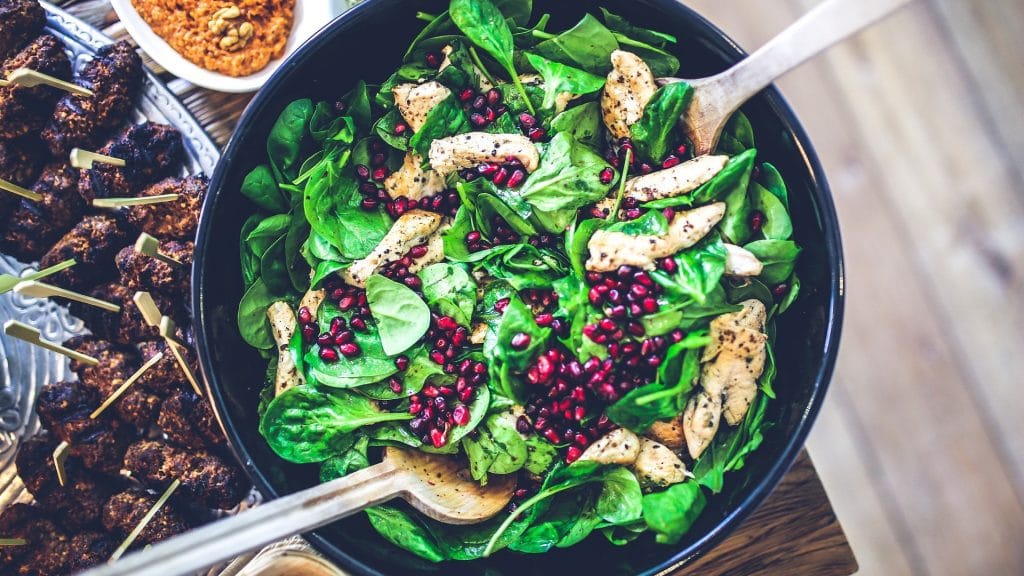29 Vitamin B9 Foods Great for Physical & Mental Health

Vitamin B9, or folate, belongs to the B-complex family, which includes eight vitamins. They are all responsible for energy metabolism, meaning they help the body produce energy by breaking down carbohydrates, fats, and protein and converting them into usable energy.
If you keep on reading, you will find out more about other vital roles of folate and how you can improve your health with vitamin B9 foods. All in all, since it is indispensable to have a balanced diet, make sure you include all the essential nutrients.
What Is Vitamin B9?
As we have already said, vitamin B9 is also known as folate. This vitamin is water-soluble, which means that it is carried through the bloodstream and excreted in the urine if not used. The term folate, or vitamin B9, refers to several compounds (folates) naturally found in food, added to some food products, and found in dietary supplements.
Folate vs. Folic Acid
A folic acid is also a form of this vitamin, but it doesn’t exist in nature. Instead, it is synthetically made and usually used as a supplement. Folate is a coenzyme that is of great importance for several reactions in our body. One of its most important functions is its role in the metabolism of amino acids and DNA and RNA synthesis.
Vitamin B9 Benefits
Apart from participating in RNA and DNA synthesis, vitamin B9 contributes to cell division and growth. It is also responsible for the production of red blood cells and improving brain health. Besides these critical functions, the benefits of folic acid, in particular, include preventing several medical conditions.
Although further research is needed to confirm this link, there is a connection between folic acid and an autism spectrum disorder. Namely, taking a folic acid supplement before conception and during pregnancy may decrease the risk of this developmental disorder.
Vitamin B9 and other B vitamins are also known for lowering the levels of homocysteine — a common amino acid that can mediate the formation of cardiovascular disease. According to a recent study, supplements of folic acid can also reduce the risk of stroke.
Folic Acid and Pregnancy
As vitamin B9 plays a significant role in synthesizing DNA, pregnant women are often advised to increase their intake of this vitamin. Moreover, folic acid has been proven to prevent neural tube defects (NTDs). Since they happen in the first month of pregnancy, it’s recommended that women take a folic acid supplement before and during pregnancy.
Furthermore, vitamin B9 might reduce the risk of preterm birth and minimize the risk of congenital disabilities, especially heart defects. Therefore, in addition to consuming sufficient amounts of foods rich in vitamin B9, women are advised to continue taking supplements of folic acid during pregnancy. Make sure you keep this in mind when planning for pregnancy.
Vitamin B9 Foods
While folic acid is available either in supplements or specially fortified foods, folate can be easily found in various foods — from fruits and vegetables to meat and dairy products. To our delight, most dark green leafy veggies and legumes are great natural sources of folate.
As for folic acid, thanks to the fortification program in the US, a wide variety of food products is enriched with folic acid to lower the risk of NTDs. This vitamin is mainly added to grain products, such as bread, cereals, pasta, rice, and flour. Food manufacturers in many other countries are also obliged to add folic acid to various food products.
Following that, below, you will find a list of food sources of folate along with a few options of foods fortified with folic acid.
Beef Liver
Not only is beef liver one of the foods high in vitamin B7, but it is also one of the good sources of folate. As little as three ounces of braised beef liver cover 54% of the vitamin’s DV. Besides being high in folate, the liver is an excellent source of minerals, such as phosphorus, copper, and selenium.
Lamb Shank
Devising how to get folate should be a walk in the park if you have a lamb shank. A three-ounce serving of lamb shank covers 5% of the vitamin’s DV. Moreover, lamb is a rich source of other B vitamins, especially riboflavin and niacin. It’s also high in various minerals, such as zinc, selenium, and phosphorus.
Blue Mussels
Blue mussels are another good source of folate. It is also abundant in vitamin B12. Notably, as little as three ounces of cooked blue mussels can cover 16% of folate’s DV and an impressive 340% of the DV for vitamin B12. In addition, mussels are high in selenium and manganese.
Blue Crab
Blue crab is another excellent addition to vitamin B9 foods. As a matter of fact, from one cup of blue crab, you will get 15% of the vitamin’s DV. Furthermore, crab meat is a great source of vitamins and minerals, like vitamin E, selenium, copper, zinc, niacin, and vitamin B6. These nutrients help with overall health and prevent various chronic conditions.
Atlantic Salmon
Atlantic salmon belongs to vitamin B9 foods, too. For example, if you eat a 6-oz filet of cooked wild Atlantic salmon, you will cover 12% of the vitamin’s DV. This fatty fish also belongs to vitamin B7 rich foods, and it is an excellent source of niacin, thiamin, vitamin B6, and selenium. Thanks to these valuable nutrients and a high content of omega-3 fatty acids, salmon has plenty of health benefits.
Eggs
Of course, we cannot omit folate in eggs. Namely, one large hard-boiled egg serves 6% of this vitamin’s DV. It’s also a great source of vitamin A, riboflavin, vitamin B5, phosphorus, and selenium. Since eggs can be prepared in many different ways and combined with a wide range of foods, you can easily add them to your eating plan.
Non-Fat Yogurt
Non-fat yogurt belongs to folate-containing foods, too. Notably, you get approximately 7% of the vitamin’s DV in one cup of this dairy product. Like other milk products, yogurt is excellent for bones and teeth as it is high in calcium and phosphorus.
Tomato Juice
Another valuable vitamin B9 food is tomato juice. Notably, one cup of 100% canned tomato juice covers 12% of the vitamin’s DV. In addition, tomato juice is rich in vitamin K, vitamin C, potassium, and magnesium. All in all, consuming the beverage might reduce inflammation and lower the risk of heart diseases.
Mustard Greens
Mustard greens are sources of vitamin B9, too. One cup of boiled and chopped mustard greens serves approximately 26% of the vitamin’s DV. Also, they are excellent sources of thiamin, niacin, and pyridoxine. As for their benefits, mustard greens could benefit heart health and boost immunity.
Spinach
Now, let’s find out how much folate is in spinach. Astoundingly, half a cup of boiled spinach provides 33% of the vitamin’s DV. Besides being a rich source of other B vitamins, such as thiamin, riboflavin, and vitamin B6, spinach boasts a high vitamin K and vitamin A content.
Black-Eyed Peas
Legumes, as in various types of beans and peas, are foods high in folate, too. In fact, half a cup of boiled black-eyed peas can cover up to 26% of vitamin B9’s DV. Moreover, these peas are a great source of dietary fiber, potassium, and iron. They help with weight loss, improve heart health, and promote digestive health.
Asparagus
When talking about asparagus, folate cannot be omitted. Namely, four boiled spears of asparagus provide 22% of the vitamin’s DV. Furthermore, this veggie is an excellent source of vitamins K, A, and E. It also contains copper, manganese, and selenium.
Kidney Beans
Foods with vitamin B9 boast another great addition, with one cup of cooked kidney beans covering 33% of the vitamin’s DV. Furthermore, they are excellent sources of protein, fiber, minerals, and antioxidants. As a result, they can help with weight loss, improve blood sugar control, and prevent colon cancer.
Brussels Sprouts
Brussels sprouts are a very healthy vegetable belonging to folate-rich foods. For instance, half a cup of boiled Brussels sprouts covers about 20% of the vitamin’s DV. What’s more, they have a high vitamin K content. This veggie is also a great food rich in vitamin C, vitamin A, and vitamin B6.
Lettuce
The list of folate vegetables doesn’t end there — one cup of lettuce can provide you with 16% of the vitamin’s DV. Moreover, lettuce is a rich source of vitamin C, vitamin A, and vitamin K, along with potassium and iron. Its health benefits include strengthening bones, improving eye health, and promoting sleep.
Artichokes
Artichokes are also excellent sources of folate. In half a cup of cooked artichokes, you will get 19% of vitamin B9’s DV. These veggies are also rich in vitamins C and A. Besides vitamins, they can provide you with many minerals, such as magnesium, manganese, and potassium. As for their health benefits, artichokes regulate blood pressure, improve liver health, and have some anticancer properties.
Broccoli
Let’s look into folate in broccoli — half a cup of this cooked vegetable covers 13% of the vitamin’s DV. In addition, it’s especially rich in vitamin K and vitamin C. Besides broccoli’s folate content, the veggie is a great source of manganese and phosphorus.
Peanuts
Folate food sources include peanuts, too. Namely, one ounce of dry roasted peanuts provides 7% of the vitamin’s DV. As for their health benefits, peanuts may aid in preventing heart disease by decreasing cholesterol levels.
Avocados
Folate in avocado is worth mentioning, too, since one avocado can cover 41% of the vitamin’s DV. Among other things, these fruits are healthy for your heart, vision, and digestion as they contain dietary fiber, omega-3 fatty acids, and other vital nutrients, including vitamins C, E, and K.
Mangoes
An easy way to add foods with folate to your diet is to eat fresh mangoes. As a matter of fact, one cup of sliced mangoes will cover 18% of this vitamin’s DV. They are also loaded with vitamin C and vitamin A. Furthermore, mangoes can provide you with some essential minerals, such as copper and potassium.
Pomegranates
Pomegranates are yet another invaluable addition to folate foods. Notably, one pomegranate serves 27% of vitamin B9’s DV. In addition, these fruits are high in vitamin C and vitamin K, and they are a rich source of copper, potassium, phosphorus, and manganese.
Strawberries
To our delight, many people’s favorite berries belong to folate foods, too. In one cup of fresh strawberries, you will get 10% of the vitamin’s DV. On top of that, they are a rich source of vitamin C and manganese. As for their health benefits, strawberries help regulate blood sugar and even prevent some types of cancer.
Papaya
If you’ve ever looked up vitamin B9 rich foods, chances are you’ve stumbled upon papaya at least once. Notably, one cup of raw and cubed papaya serves 13% of the vitamin’s DV. It also contains antioxidants, vitamin E, vitamin C, and vitamin A. As for its health benefits, papaya reduces the risk of heart disease by preventing the oxidation of cholesterol.
Oranges
Good news for those who cannot last a day without citrus — you can find folate in oranges! For example, one orange covers around 10% of the vitamin’s DV. Thanks to their vitamin content, oranges can boost our immune system and improve our overall health. They also protect our cells from damage and help with the absorption of iron to fight anemia.
Breakfast Cereals
As mentioned before, some foods, mainly grain products, can be fortified with folic acid. When looking for folic acid foods, pay attention to the product’s label as the content will vary by brand. That being said, one serving of most breakfast cereals fortified with folic acid might cover up to 100% of the vitamin’s DV.
Rice
Another addition to sources of folic acid is rice. Namely, one cup of cooked rice might cover as much as 24% of the vitamin’s DV. It’s also a good source of other B vitamins, including vitamin B5, thiamin, and niacin. As always, check the product’s label to find out the exact level of fortification.
Egg Noodles
Enriched egg noodles belong to foods with folic acid, too. One cup of cooked and enriched egg noodles will help you cover around 35% of folic acid’s DV. Moreover, these noodles contain thiamin, riboflavin, niacin, and vitamin B12. This food is also rich in minerals, such as selenium, manganese, and iron.
Spaghetti
Enriched spaghetti is a good source of B9 vitamin foods. As little as 100 g of cooked and enriched spaghetti serves around 30% of the vitamin’s RDA. In addition, this type of pasta provides you with thiamin, selenium, and manganese.
White Bread
Various types of bread are good vitamin B9 food sources. For example, one slice of white bread made with enriched flour covers 35% of the vitamin’s DV. Manufacturers tend to fortify this bread with micronutrients lost during the grain refining process. In other words, white bread might include various nutrients, such as iron and other B vitamins.
Folate Recommended Daily Intake
The Food and Nutrition Board (FNB) devised the Dietary Reference Intakes, which lists the recommended daily values for all the nutrients, including folate.
Below you can see the Recommended Dietary Allowances (RDAs) for folate. They are expressed in mcg of dietary folate equivalents (DFEs), which can be converted to mcg of food folate or mcg of folic acid as follows:
- 1 mcg DFE = 1 mcg food folate
- 1 mcg DFE = 0.6 mcg folic acid from fortified foods or dietary supplements taken with food
- 1 mcg DFE = 0.5 mcg folic acid dosage from dietary supplements taken on an empty stomach
RDAs for vitamin B9 vary depending on age:
- from birth to 6 months — 65 mcg DFE
- from 7 to 12 months — 80 mcg DFE
- from 1 to 3 years — 150 mcg DFE
- from 4 to 8 years — 200 mcg DFE
- from 9 to 13 years — 300 mcg DFE
- 14+ years — 400 mcg DFE
It’s important to emphasize that pregnant women should take 600 mcg DFE, and breastfeeding women need 500 mcg DFE.
Vitamin B9 Deficiency
A poor diet lacking folate can result in a deficiency in this nutrient. Besides a low intake of vitamin B9, alcohol use disorder and malabsorptive disorders may also lead to vitamin B9 deficiency. That’s why people with a deficiency in vitamin B9 are usually deficient in other nutrients as well.
This type of deficiency can cause megaloblastic anemia, with symptoms as follows:
- weakness
- fatigue
- headaches
- problems with concentration
- heart palpitations
Other folate deficiency symptoms include:
- ulcerations on the tongue
- mouth sores
- pigmentation changes
- higher levels of homocysteine
- gastrointestinal problems
Women with lower concentrations of folate are more likely to give birth to infants with NTDs. In addition, they are at higher risk of preterm delivery and giving birth to infants with low birth weight.
Who Should Take Vitamin B9 Supplements?
Women of childbearing age are recommended to take folic acid supplements to lower the risk of NTDs and other congenital disabilities. Also, considering the importance of folic acid for pregnancy, pregnant women need to take multivitamins or dietary supplements with folic acid. This vitamin is crucial for nucleic acid synthesis — producing a complex organic substance present in living cells, especially RNA and DNA.
Not only do alcoholics have poor diets, but they also have problems with the absorption of folate because of alcohol. Therefore, they can benefit from taking supplements to either prevent or treat folate deficiency.
Furthermore, certain medical conditions can affect the levels of folate as well. For example, malabsorptive disorders, like celiac disease and inflammatory bowel disease, may cause nutrient deficiency. Also, people with MTHFR polymorphism should take supplements since this medical condition affects the conversion of folate to its active form.
Side Effects of Vitamin B9
Since a high intake of folate can alleviate some symptoms of vitamin B12 deficiency, there is a possibility that high doses of vitamin b9 supplements can “hide” this deficiency, which can cause neurological damage if not treated. Moreover, a large amount of folic acid may increase the risk of certain cancers.
If you take high doses of folic acid, your body might not be able to transform it into the active form of folate, which results in unmetabolized folic acid in the body. That can affect your immune system as unmetabolized folic acid may reduce the number and activity of natural killer cells.
The FNB provided Tolerable Upper Intake Levels for the synthetic forms of folate used in supplements and fortified foods. They don’t apply to those who take dietary supplements under medical supervision. That said, there isn’t conclusive evidence that folate from food sources can cause adverse effects on our health.
Conclusion
Folate is necessary for several vital functions in our body, such as producing red blood cells and synthesizing DNA. Another essential vitamin B9 function is the prevention of neural tube defects. Therefore, women of childbearing age and pregnant women are advised to increase their vitamin intake.
People with a healthy, balanced diet are unlikely to develop a deficiency as there is a wide range of folate foods, including meat, fish, dairy products, vegetables, and fruits.
That said, certain groups of people are recommended to take folic acid as a supplement. Still, you shouldn’t take dietary supplements without medical supervision as high doses may have side effects.
FAQs
What does vitamin B9 do?
Vitamin B9, or folate, plays numerous crucial roles in our body. It is responsible for the production of red blood cells, the synthesis of DNA and RNA, and cell division and growth. Other B9 vitamin benefits include contributing to brain health and promoting normal fetal growth and development. That’s why it is of great importance to pregnant women and women planning to get pregnant.
Is vitamin B9 the same as folic acid?
Vitamin B9 is the umbrella term for many folates naturally found in food and folates found in fortified food products and supplements, including folic acid. Therefore, folic acid is just one form of vitamin B9, made synthetically.
Does folic acid have side effects?
It is believed that a high intake of folic acid can mask a vitamin B12 deficiency, which can pose a significant health risk since it’s imperative to treat this type of deficiency on time. Otherwise, it can lead to severe neurological damage.
Also, your body may not be able to transform high doses of folic acid into the active form of vitamin B9. Consequently, unmetabolized folic acid can damage your immune system.
What is vitamin B9 deficiency?
This deficiency is a medical condition characterized by low levels of folate. Some of the vitamin B9 deficiency symptoms are fatigue, mouth sores, and tongue swelling. Moreover, B9 deficiency can be caused by a poor diet, alcoholism, and malabsorptive disorders, such as celiac disease and inflammatory bowel disease. Sometimes, folate deficiency causes anemia. Its symptoms include weakness, shortness of breath, and irritability.
Who needs folic acid the most?
Women should take folic acid before pregnancy or during pregnancy, as it helps prevent severe congenital disabilities. In addition, you can get folic acid from food or supplements. Namely, it can be found in fortified rice, bread, pasta, and cereals.
How can I increase my folate intake?
You can quickly increase your folate intake by consuming foods rich in this vitamin. Thankfully, folate is easily found in many foods. Thus, people with various diets can cover their recommended daily intake without any problems.
What foods are high in vitamin B9?
Folate is naturally found in numerous foods, including meat, fish, seafood, eggs, dairy products, fruits, and vegetables. As for folic acid, it is often added to cereals, bread, pasta, rice, and flour.
Vitamin B9 foods that are exceptionally high in folate include various sorts of beans and peas, asparagus, spinach, turnip greens, and other green leafy veggies.





